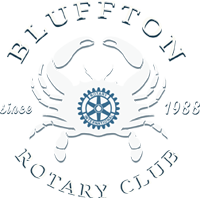Cardiologist Dr. Sharp speaks from the heart.
People over 50 have probably heard it a thousand times: Exercise is a vital part of staying healthy and preventing heart disease. But what they may not know is that regular exercise can also serve as an early warning system when heart problems develop.
“Think of it as a self-stress test,” cardiologist Dr. John C. Sharp Jr. told Bluffton Rotarians. “If exercise is part of your routine and if your heart is accustomed to handling the increased workload from exercise, then your regular workout can help you identify problems early from symptoms like chest pain, fatigue and shortness of breath.”
Dr. Sharp, who has practiced in the Lowcountry for 13 years, cited heart disease is the No. 1 killer of American men and women and also the nation’s No. 1 health care expense.
Dr. Sharp said that aging inevitably brings on an increased risk of blocked coronary arteries – and heart attacks.
“The heart is a pretty miraculous machine,” he said. “But 50 percent of Americans over the age of 50 have some sort of heart condition, and it’s not something that can be ‘cured.’ ”
Dr. Sharp said that the key to healthier aging is preventive maintenance, and for people with risk factors for heart disease – he cited examples like poor diet, smoking and a family history of heart problems – the priorities should be on cholesterol management and aspirin therapy.
Statins – drugs such as Lipitor and Zocor – can lower cholesterol levels and help to keep arteries from becoming clogged. And Dr. Sharp said that 40-45 minutes of exercise, four to seven days a week, can reduce cholesterol levels by as much as 15 percent.
For patients with risk factors, taking 81 mg “baby aspirin” every day can inhibit clotting from blood platelets. “Aspirin is possibly the most important weapon we have in guarding against a heart attack or stroke,” he said.
In a heart-related crisis, Dr. Sharp said, the critical factor is time.
“Time is muscle,” he said. “We can open up coronary blood vessels within 60 minutes through catheterization, and by doing that we can save heart muscle that a blockage will permanently destroy without a fast response. If you notice the symptoms, don’t mess around

